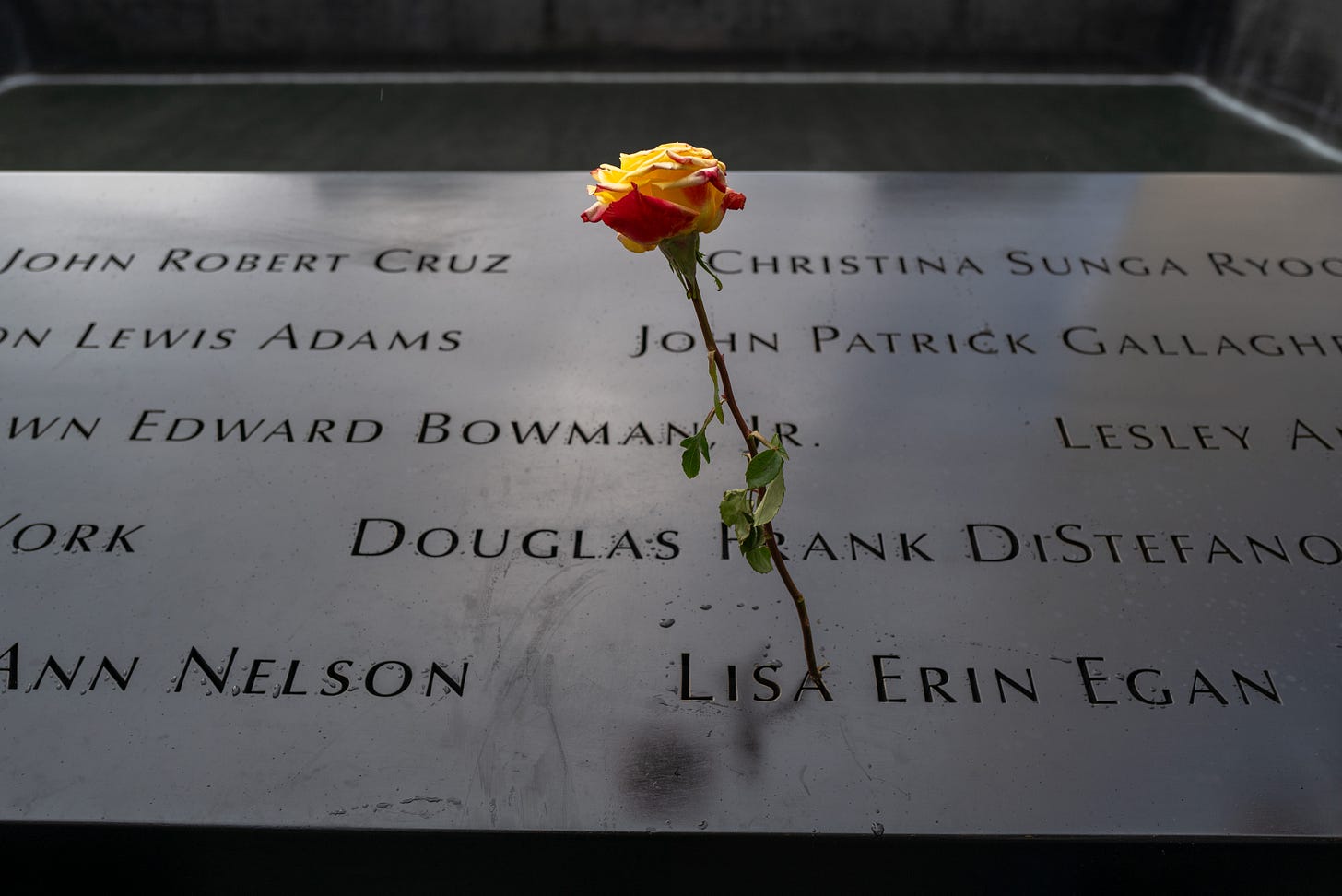Questions on 9/11
So much remains unanswered — and maybe unanswerable
September 11. An immense tragedy. An inflection point. A moment of heartbreaking “what ifs.”
Despite the 22 years that have elapsed, we still have countless questions with no simple or fully satisfactory answers.
At the time, we promised ourselves that we would “never forget.” Have we kept that promise?
When we do remember, how do we honor the loss and sacrifice?
Were we strengthened by our response?
Did we become more unified?
What about the wars that followed — Afghanistan at first, but also Iraq, and an amorphous global war on terror? Have they ended? What was gained? What was forsaken?
Does this date still reverberate as it did in the years immediately following?
Do you see it approaching on the calendar and take note?
What do you remember of the day itself?
What have we forgotten, individually and collectively?
How do we teach the story to the millions of Americans born after it occurred?
How do we reconcile what happened then with all that has transpired since?
For those living in New York — the epicenter — and those who have traveled there, how do you feel as you approach Ground Zero?
As we wind through checkpoints at airports, do we remember the antecedents of the enhanced security?
To all those who lost family members, how has the interceding time shaped your memories and feelings?
Have we ever gotten a full accounting from Saudi Arabia of what its leaders knew concerning the attacks’ financing and origins? If not, why not?
Twenty-two years is a long time. And we had no way of knowing on that day what would come next. There was a feeling of immediate uncertainty that, in a way, has never left us.
Are we more wary? More tentative? More bombastic?
Do we think of our nation differently? Of its politics? Its strengths and limitations? Its place in the world?
Did 9/11 change everything?
This newsletter is supported by the Steady community. Please consider subscribing if you aren’t already a member.


In a moment of horrific crisis, leadership is crucial. George Bush and Dick Cheney exploited our vulnerability and lied us into a costly senseless war in Iraq that eroded the goodwill from around the world. We destroyed a country that had nothing to do with 9/11 and killed thousands if not millions in the process.
Same with the pandemic: how many lives could have been saved if we had had a leader who had taken the crisis seriously not made it a political issue.
As 9/11 recedes in our memories, will we select leaders of the future who can unite us and lead us with wisdom? Leadership always matters.
I see 9/11 less as as a dividing line than as an end point: the end of the American era, the beginning of the Republican march to total power.
The horror of that September day capped two decades of an internal, domestic attack on civic consensus democratic governance and constitutional norms that had started with the rise of Reagan in 1980, and whose most dramatic expression was a thoroughly domestic terrorist act that shocked us as 9/11 would a few years later: Timothy McVeigh's April 1995 attack in Oklahoma City.
That lethal act of terrorism left 168 innocent human beings dead. 19 of them were children who had been present in a day care center at the Alfred P Murrah Federal Building.
That attack on our government, our democracy, our people, our children, was the most hideous and lethal act of terrorism that had ever taken place on our home soil until 9/11. It was 100% home grown terror, carried out, not by mysterious Muslim "Others," but by a clean-cut, white, Catholic, ex-military, pious, conservative all-American boy.
Our reaction to 9/11 half a decade later, layered on top of the rise of Gingrich/Limbaugh Republicanism, in a nation already polarized by a 24/7 propaganda machine, was catastrophic.
In the years since, it has led to the creation of more Timothy McVeighs, as popular rage at "those people," the Other, the dark-skinned, the worshippers in other faiths, became part of the Fox-orchestrated response to the general chaos in our country.
A whole contingent of Timothy McVeighs showed up at the US Capitol on January 6, 2021, in an environment in which Fox and Twitter had made the likes of Kyle Rittenhouse into heroes. God help us, we've got a long way to go.
The civic harm that has been done to the national spirit in that interval from the Murrah Building to the Twin Towers and beyond won't be repaired any time soon. As the old saying goes, it's a heck of a lot easier to burn down a barn than it is to build one. The barn has well and truly been burned to the ground. We have to believe in democracy---really believe in it, heart, soul, and mind----if we are to defend and rebuild ours.